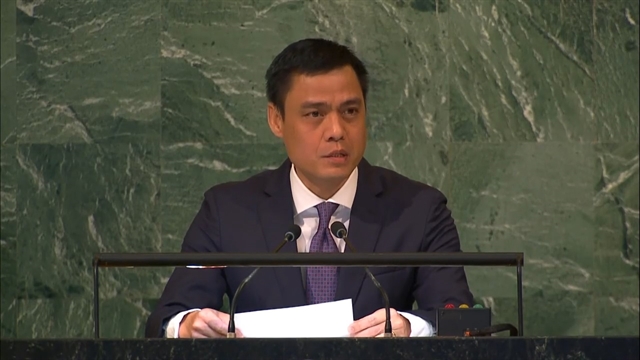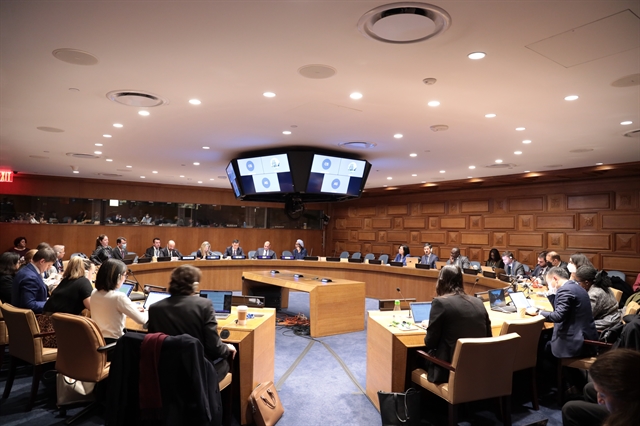 Politics & Law
Politics & Law


|
| Vietnamese Ambassador Đặng Hoàng Giang at the 77th UN General Assembly session on the 40th anniversary of the 1982 United Nations Convention on the Law of the Sea (UNCLOS) held in New York. — VNA/VNS Photo |
NEW YORK — Vietnamese Ambassador Đặng Hoàng Giang underlined the historic significance of the 1982 United Nations Convention on the Law of the Sea (UNCLOS) to all humankind, while representing more than 40 member states of the UNCLOS Group of Friends at a meeting in New York on December 8 (US time).
The 77th UN General Assembly session meeting celebrated the 40th anniversary of the adoption and opening for signature of UNCLOS..
Co-chairing the meeting, Ambassador Giang, Permanent Representative of Việt Nam to the UN, said UNCLOS held historical significance to all humankind as it marked an important milestone in the development of international law of the sea and the orderly and sustainable use of the oceans.
More than 40 states from all continents and regional groups of the UN reaffirmed that UNCLOS was a globally recognised legal framework regulating all activities in the seas and oceans, which has been repeatedly emphasised in resolutions of the UN General Assembly. They held that the convention helped enhance international peace, security, and stability, resolving disputes, and promoting sea-based activities, fostering the development of each country and the entire international community, according to the diplomat.
He also stressed that UNCLOS's maintenance and full implementation was now more urgent than ever amid many long-term challenges, including sea disputes, transnational organised crimes at sea, resource exhaustion, and emerging maritime issues, including climate change impacts.
"Given this, all countries have to comply with obligations under the convention. Their activities, including maritime claims and sea-based activities, must accord with UNCLOS to help conserve and sustainably use the oceans and marine resources," Giang went on.
The ambassador said that all disputes needed to be resolved peacefully with full respect for the mechanisms and legal processes stipulated in UNCLOS.
On this occasion, he also said that the UNCLOS Group of Friends stayed steadfast in pursuing their original goals, especially improving the awareness and implementation of UNCLOS, promoting cooperation, identifying challenges, and working together to surmount those challenges.
In his speech, UN Secretary-General Guterres said the adoption of UNCLOS by most nations of the world 40 years ago was a "vital step to bring governance and order" to the vast collective treasure that is the ocean.
He held that the 40th anniversary should be "an important reminder to continue using this critical instrument to tackle today's challenges."
At the meeting, groups of states also highly valued the role of UNCLOS, perceiving that the adoption of the convention 40 years ago, for the first time, created a comprehensive legal framework for sea-related activities.
They also hailed enormous contributions by UNCLOS and the bodies established under this convention, including the International Tribunal for the Law of the Sea, the Commission on the Limits of the Continental Shelf, and the International Seabed Authority, to the maintenance of the order of the oceans, as well as the conservation and sustainable use of marine resources.

|
| A workshop on achievements and challenges since the adoption of the 1982 United Nations Convention on the Law of the Sea (UNCLOS) 40 years ago. — VNA/VNS Photo |
The same day, Việt Nam, in coordination with Greece, Egypt and Senegal, hosted a workshop on achievements and challenges since the adoption of the 1982 United Nations Convention on the Law of the Sea (UNCLOS) 40 years ago.
The main topics at the event were the outcomes of the convention, sea level rise and the relationship between UNCLOS and Sustainable Development Goal 14, which is to conserve and sustainably use the oceans, seas and marine resources for sustainable development.
Addressing the workshop, Under-Secretary-General for Legal Affairs and UN Legal Counsel Miguel de Serpa Soares emphasised that the convention's ratification was a historic milestone of the consensus among nations to develop a comprehensive legal framework for activities at sea.
He also highlighted the major challenges relating to the convention's implementation, such as conservation and sustainable use of the sea.
Countries should pay more attention to the rights of vulnerable people and those whose livelihoods depend on the ocean. At the same time, the diplomat said it would strengthen international cooperation, build capacity, improve ocean governance, and attract the participation of small and less developed island states at sea forums.
Prof. Nguyễn Hồng Thao, a member of the UN's International Law Commission, spoke about the integrity of the 1982 UNCLOS in the face of "unforeseeable" issues when the convention was born, including sea level rise. According to the professor, all countries seek to handle many ocean issues within the current legal framework provided for by UNCLOS instead of building regulations outside the convention.
Discussions at the workshop focused on the difficulties of developing countries in maritime boundary delimitation, the counselling function of the International Tribunal for the Law of the Sea and some emerging issues related to the law of the sea and maritime governance.
In his concluding speech at the end of the workshop, Ambassador Đặng Hoàng Giang, who chaired the workshop, reaffirmed countries' commitment to the universal goals and principles outlined in the UNCLOS and expressed his wish to cooperate with other members to promote the convention's role in addressing common challenges, maintaining peace, stability, cooperation and sustainable development for the interests of present and future generations. — VNS




